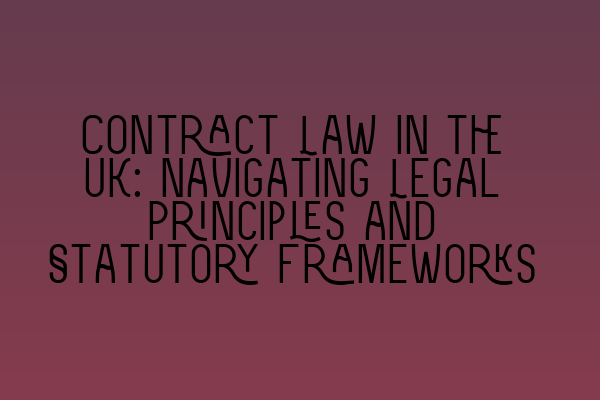Contract Law in the UK: Navigating Legal Principles and Statutory Frameworks
Contract law is a fundamental aspect of the legal system in the United Kingdom. It governs the formation, interpretation, and enforcement of agreements between parties, ensuring fair and binding transactions. Understanding the principles and statutory frameworks of contract law is essential for solicitors and anyone involved in commercial activities.
In this comprehensive guide, we will explore the key concepts and elements of contract law in the UK. Whether you are a law student preparing for the SQE exam or a professional seeking to refresh your knowledge, this article will serve as a valuable resource.
Formation of a Contract
A contract is formed when two or more parties reach an agreement, supported by consideration, and intended to create legal relations. To establish the validity of a contract, several essential elements must be met:
- Offer and Acceptance: One party, known as the offeror, must make a clear and unequivocal offer to another party, the offeree. The offeree must accept the offer without any conditions or modifications for an agreement to be reached.
- Intention to Create Legal Relations: Parties must have a genuine intention to enter into a legally binding contract. Social and domestic agreements generally do not possess this intention, while business transactions carry the presumption of legality.
- Consideration: Each party involved must provide something of value, called consideration, as part of the agreement. Consideration can take the form of money, goods, services, or even a promise to do or refrain from doing something.
- Capacity: Parties entering into a contract must have the legal capacity to do so. This means they must be of sound mind, of legal age, and not under any undue influence or duress.
- Consent: Consent is crucial for a contract to be valid. Both parties must willingly and knowingly consent to the terms of the agreement, without any misrepresentation, mistake, or fraudulent inducement.
These elements form the foundation of a contract, establishing its validity and enforceability. It is vital to understand each element’s significance to navigate contract law with confidence.
Interpretation and Terms of a Contract
Once a contract is formed, the next step is interpreting its terms. Contracts can be expressed explicitly or implied through the conduct of the parties involved. The terms of a contract may be written, oral, or a combination of both, depending on the circumstances.
When interpreting a contract, the court’s objective is to give effect to the parties’ intentions as reflected in the agreement. If the terms are ambiguous or unclear, the court will consider various factors, including:
- Custom and Trade Usage: The court may consider customary practices and trade usages relevant to the particular industry or business sector.
- Course of Dealing: The previous interactions and conduct between the parties can shed light on their intentions and the meaning of the terms.
- Objective Standard: The court will adopt an objective approach, considering how a reasonable person would interpret the terms in the given circumstances.
It is crucial to ensure contracts are drafted precisely and unambiguously to minimize potential disputes or misunderstandings. Seeking legal advice or utilizing professional contract drafting services can help safeguard the parties’ interests.
Enforcement and Remedies
When a party fails to fulfill its obligations under a contract, the injured party can seek remedies to enforce the agreement. Common remedies include:
- Damages: Monetary compensation awarded to the aggrieved party for the loss suffered as a result of the breach of contract.
- Specific Performance: An equitable remedy where a court orders the breaching party to fulfill their contractual obligations as agreed.
- Rescission: Setting aside the contract and returning the parties to their pre-contract positions in cases of fraudulent misrepresentation or mistake.
- Injunctions: Court orders preventing a party from taking certain actions or enforcing specific terms of the contract.
The appropriate remedy depends on the nature of the breach and the circumstances surrounding the contract. It is essential to consult with a solicitor or legal professional to determine the most suitable course of action.
Conclusion
Contract law plays a vital role in regulating commercial transactions and protecting the interests of parties involved. Understanding its principles and statutory frameworks is essential for solicitors, law students, and anyone participating in contractual agreements.
If you are studying for the SQE exam, make sure to check out our SQE 1 Practice Exam Questions and SQE 1 Practice Mocks FLK1 FLK2 articles for valuable practice resources. Additionally, if you are seeking further SQE exam preparation or general legal education, our SQE 2 Preparation Courses and SQE 1 Preparation Courses may be of interest to you. Stay updated with the latest SRA SQE Exam Dates to plan your preparations effectively.
Remember, when dealing with contracts, it is always recommended to seek professional legal advice to ensure your rights and obligations are protected.
